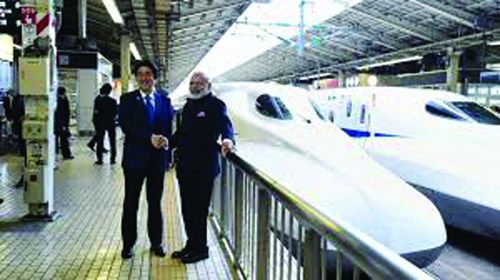TOKYO, JULY 8

Japan’s former Prime Minister Shinzo Abe has been taken to hospital after apparently being shot during a campaign speech in the western city of Nara, says media reports. The NHK broadcaster, citing the local fire department, said on Friday that the 67-year-old “is showing no vital signs”.
Japanese police told local media Abe appeared to have been shot from behind with a shotgun. He collapsed at around 11:30am (02:30 GMT).
NHK said its reporter on the scene heard “what sounded like a gun going off twice” and saw Abe bleeding.
The broadcaster aired footage showing Abe collapsed on the street, with several security guards running toward him. Abe was holding his chest when he collapsed, with his shirt smeared with blood.
Kyodo News said Abe was not conscious and appeared to be in cardiac arrest.
The agency said the former prime minister was attacked by an unidentified man on a street near the Yamatosaidaiji Station in Nara.
Abe was in the city campaigning ahead of Sunday’s election for the parliament’s upper house.
NHK said a male suspect has been taken into custody on suspicion of attempted murder. The man, who appeared to be in his 40s, was holding a gun, which police confiscated, it added.
The United States’s Ambassador to Japan Rahm Emanuel said he was “saddened and shocked” by Friday’s shooting.
“Abe-san has been an outstanding leader of Japan and unwavering ally of the United States,” he said in a statement.
“The US government and American people are praying for the well-being of Abe-san, his family, and the people of Japan.”
Abe served as Japan’s prime minister from December 2012 to September 2020, making him the
country’s longest-serving prime minister.
He cited ill-health for his decision to step down, but has remained a dominant presence over the ruling Liberal Democratic party (LDP) party, controlling one of its major factions.
Abe, who hails from a wealthy political family that included a foreign minister father and a great-uncle who served as prime minister, has been best known for his signature “Abenomics” policy featured bold monetary easing and fiscal spending.
He also bolstered defence spending after years of declines and expanded the military’s ability to project power abroad.
In a historic shift in 2014, his government reinterpreted the postwar, pacifist constitution to allow troops to fight overseas for the first time since World War II. The following year, legislation ended a ban on exercising the right of collective self-defence, or defending a friendly country under attack.
But he did not achieve his long-held goal of revising the US-drafted constitution by writing the Self-Defense Forces, as Japan’s military in known, into the pacifist Article 9.












